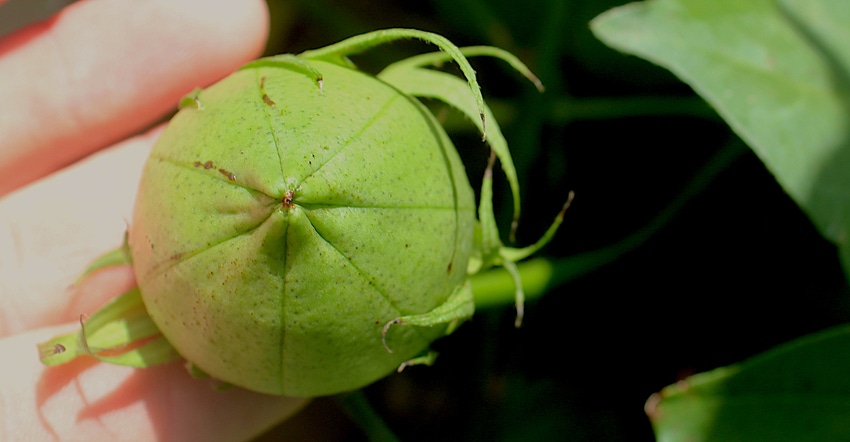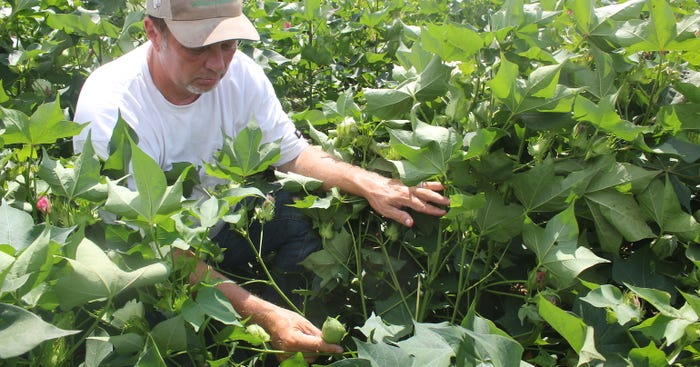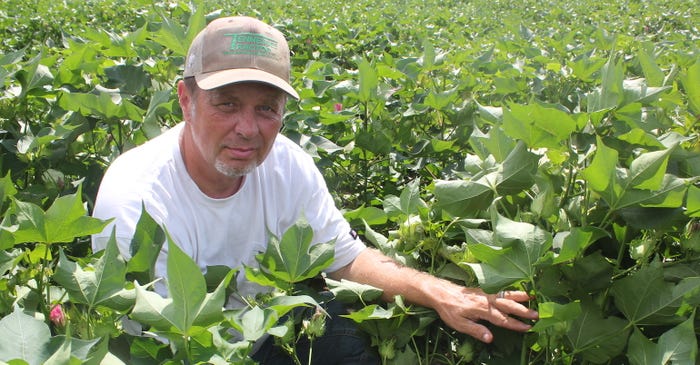
Randall Taylor may need to buy a lottery ticket. This Tennessee farmer and crop consultant has certainly beaten the odds … at least when it comes to scouting cotton.
On August 16, Taylor found a seven-lock cotton boll while scouting a Haywood County field. After more than 30 years of inspecting cotton crops, this was his first time to find a seven-lock boll.
“I couldn’t believe it,” Taylor said. “If finding a six-lock boll is like finding a four-leaf clover, finding a seven-lock boll is like finding a five-leaf clover, because they just don’t exist.”
What makes the story even more remarkable is that a few days earlier in a field five miles away, Taylor was shown another seven-lock boll that had been discovered by a fellow crop consultant. As he continued to walk that field, Taylor found a six-lock boll.
If you’re keeping score, that’s two seven-lock bolls and one six-lock boll in less than one week’s time.
“I would have never imagined finding a seven-lock boll, let alone seeing two in one week. And then finding a six-lock boll on the same day as a seven is even more incredible,” Taylor said. “In all my years working around cotton, I’ve never had a week like that.”

Lucky bolls
Both seven-lock bolls are NexGen 4936 variety. Both are in fields farmed by Johnny Verell of Jackson, Tenn. This is Verell’s first year going back with cotton after a long hiatus.
The seven-lock bolls were both first position bolls on node 6 and node 7, respectively, according to Taylor. One was left on the branch, but Taylor removed the other to dissect it. Sometimes high-lock bolls are small and irregular. These bolls were big and, according to Taylor, full of seeds.
“The bolls were not deformed. The locks were uniform. In the boll I cut open, I counted 44 seeds,” Taylor said.
A typical five-lock boll may average seven to eight seeds per lock. Taylor’s boll averaged just more than six per lock, but as he points out, that’s still more seeds per total boll than average.
“More seeds typically mean more lint,” Taylor said, “so I see this as a good sign.”
The fact that both seven-lock bolls were of the same variety in different fields is another improbable part of the story.
“It’s something you love to see, but it’s definitely an anomaly,” said Lloyd McCall, breeding manager with Americot. In his many years of cotton breeding, McCall has found several seven-lock bolls. He can even recall finding a 10-lock boll. But he could never replicate the high lock numbers when planting seeds from those bolls in his research.
“We’re not sure what causes a plant to produce bolls with six or more locks, but it is most likely a response to environment,” McCall said. “If there is a genetic component it’s masked well.”
“In my opinion, the discovery of these bolls says a lot for the consultants. Obviously, they have their heads down in the cotton and are scouting thoroughly.”
Rare finds
Apart from plant breeders like McCall, you would probably be hard pressed to find someone who has personally encountered a seven-lock cotton boll. Taylor knows just how special his discovery was.
He’s spent a lifetime around cotton and started his scouting business when he was just 16. Early in his career he says he found a six-lock boll. He has been on the lookout for more ever since.

“I’m always searching for them. It’s almost like a hobby,” he says. “This was my fifth time to find a six-lock boll. Some people never even see a six-lock boll. I certainly would have never imagined seeing a seven-lock.”
Taylor will continue combing fields for six and now seven lock cotton.
The Tennessee lottery estimated jackpot is up to $256 million. He may need to give it another look, too.
About the Author(s)
You May Also Like






